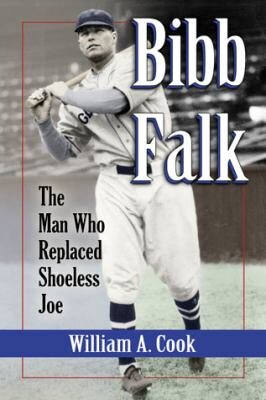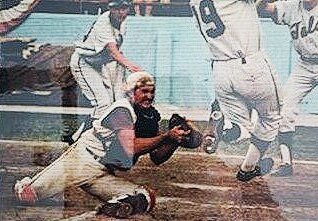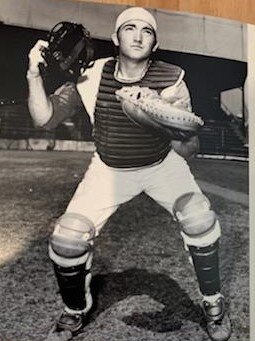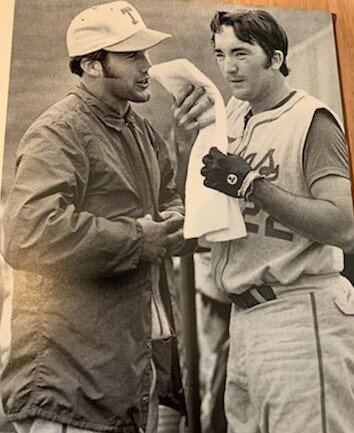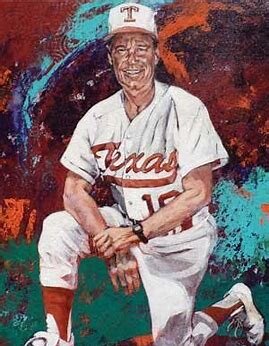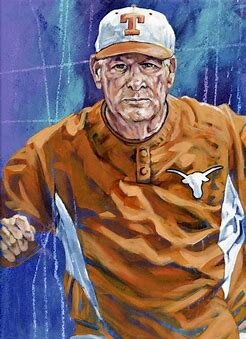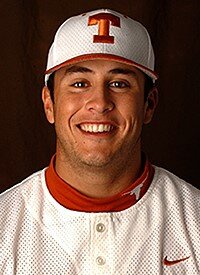Article written in early 2020
WE ALSO PLAY A LITTLE BASEBALL
Tommy’ Harmon’s T-ring reflection
Tommy Harmon has lived a blessed life. Even though Tommy is now in his 70’s, he still has a boy's view of his life when discussing his Longhorn roots. Tommy Harmon says, "I still have a forever-lasting love for the Longhorns and continue to get chills every time I hear the Eyes of Texas."
There are many articles that discuss the techniques used to recruit high school athletes, but little is said about the most natural recruiting method – family and friends. All recruiters would covet the simple process required to sign Tommy Harmon to a longhorn letter of intent.
Tommy says, “ Luther Scarborough, basketball and baseball lettermen at Texas in the 1950s, lived in Fort Worth. My junior high football coach Preston Thompson and Luther were bird dogs for Coach Falk in the Fort Worth area. In March of 1967, they came over to my house and asked me if I wanted to go to the University of Texas on a full scholarship and play baseball. Of course, I said, “Yes.” In April of that spring, Texas came to Forth Worth to play TCU in a Southwest Conference baseball game. I attended the game with Mr. Scarborough and Coach Thompson and met Coach Falk for the first time. I had a short, colorful conversation with Coach Falk; by colorful, if you know Coach Falk, you know what I mean. This was the extent of my recruiting process.”
If you don’t know the colorful side of Coach Falks , then Spanky Stephens story will fill in the blanks. Spanky says:
Spanky says, "in 1975, when the Longhorn baseball team moved from the old baseball field to Disch Falk, I found a Billy Disch sign back in an old storeroom. I took it with me and placed it in the new baseball locker room. Coach Bibb Falk came by for a tour, and what a hilarious story that is." "Bibb Falk disliked everything about the new baseball facility - locker room, coaches office, and showers, but when he saw the Billy Disch sign hanging in the new baseball facility, he raved about it."
"So, three days later, Falk brings 3 of his cronies down to show them the new facility. I was taken back. Instead of voicing displeasure about the new baseball facility, he was raving about the great facility, but his proudest moment of the tour was the sign. He told them his story and reflected on the special memories of a special time in his life, and he was happy. "
When Tommy arrived in Austin, Coach Falk had retired, and Coach Gus was the new head coach. Tommy's freshman year, 1968 season, the NCAA made freshmen eligible for baseball. Tommy says, "Therefore, Coach Gus's first game at Texas as Head Coach was my first game as a player." It was an ominous start for the 1968 team losing their first three games in the SWC for the first time in the history of Longhorn baseball.
In the book Texas Longhorn Baseball by Wilbur Evans and Bill Little, the authors state that after the 3rd loss, "Gustafson gathered his troops around him ……. he herded them all too shallow centerfield ….Gustafson held what has since become known as 'the centerfield meeting' ".
Tommy Harmon said, "I just remember I was scared." He had a right to feel that way. Gustafson said, "it was time for him to emphasize who was going to be running the show, who was calling the shots. And he told them he was not convinced that the squad had given him their dedication over those three conference games." One player quit, and the speech made believers of the players. Texas won 12 of the next 13 games.
Tommy was a primary reason why the Longhorns won in 1968. As a freshman, he was second to Pat Brown with a hitting average of .307 when the team average was .244. A start to a great career as a Longhorn.
According to Tommy, Gus Ball was not the small ball way; it was:
Strong Pitching and Defense
Forcing opposing pitchers to throw strikes
An abundance of preparation through hours and hours of practice
Most of all, it was winning.
While at Texas, Coach Gus's teaching philosophy led to College World series invitations in 1968, 1969, and 1970. In 1969 and 1970, the team was ranked #1 in the nation most of the year. The 1970 pitching staff still holds the team record for lowest ERA (1.88) During The Modern Era.
He is proud of his College All American status, but in reflection he says that “choosing to play at Texas was a great decision for me," for more reasons than baseball. He met his wife Debbie at Texas and they have two children and 5 grandchildren . He says, "my family is the greatest joy of my life."
He also cherishes the life long friendships he made as a Longhorn, including teammates, classmates, coaches, and mentors.
Tommy shares two stories close to his heart that are still vivid memories of his Longhorn years.
Burt Hooton
#1 "In 1969, we were playing TCU at Clark Field. Burt Hooton, "greatest college pitcher of all-time," was pitching, and Jeff Newman was hitting for TCU. Burt was known for an unhittable knuckle curveball. During the prior weeks, Coach Gus was intent on teaching Burt to throw a slider as a third pitch. During games, Coach Gus would never call pitches from the dugout. However, in this particular game, Coach Gus did call for a slider. I put down a slider sign and Hooton shook it off, I put down it again and Hooton shook it off; I put it down again and pointed towards Coach Gus. This time Hooton threw the slider and Newman crushed it 450 ft. over Billy Goat Hill. That was the last pitch Coach Gus called the rest of my playing career at UT, and when I returned as a Longhorn coach in 1990, he had me call pitches for the team.
#2 "A quick lesson I learned from Coach Gus; he always allowed us to be ourselves on the field. He used your strengths in a masterful way. There were not a lot of rules because he told me once, "the more rules you make, the greater chance it will affect your best player, so don't have too many team rules," which he did not. "Just be on time, hustle, and be accountable for your mistakes."
Tommy did not share the following Longhorn story, but I will.
A HARD TAG GETS STREET AND HARMON IN TROUBLE WITH SWC.
Tommy Harmon uses a "hard" tag on a Baylor player, and an angry Baylor coach runs toward home plate to protest the tag. James Street sees the coach running at Harmon and reacts instinctively and accidentally hits the Baylor coach in the stomach. The play makes national news. Street apologizes to the Baylor Coach, but the coach refuses his apology. Harmon and Street are later cleared of willful misconduct by an SWC committee, but both Longhorns were put on probation.
Harmon received his bachelor's degree in 1975, and, in 1993 was inducted into the Longhorn Hall of Honor.
His Professional baseball years
Following his collegiate career at Texas, Harmon enjoyed an eight-year professional baseball career and then embarked on a coaching journey that eventually saw him become the youngest coach in the National League as the Chicago Cubs' bullpen coach in 1982.
Tommy returns to Texas as an assistant to create more Longhorn baseball sports history.
A picture is worth a 1000 words. Photo is Harmon and Coach Gus.
Tommy Harmon is a prodigy of Coach Gus and like Coach Gus Tommy has his priorities right. He believes "being part of two National Championship teams was great, but the most rewarding thing was watching boys turn into men both on and off the field. Today I continue to watch them become great husbands, fathers, community leaders, and successful leaders in all walks of life. We remain very close friends of many of our former players to this day."
Harmon returned to Texas as an assistant and first base coach from 1989-1996. In 1997 he was promoted to Associate Head Coach, team recruiting coordinator, and 3rd base coach.
He excelled in recruiting, signing the #2 and #3 recruiting classes in 1997 and 1998. This recruiting core of student-athletes in 2000 returned Texas to the CWS for the first time since 1993.
Tommy's recruiting skills helped the Longhorns record eight 40-win seasons from 2002-10 and produced 60 professional players. During those years, 14 of the 22 teams batted over .300. In his 21 seasons as a coach on the Forty Acres, Harmon molded the careers of 29 All-Americans and 102 All-Conference performers. He played a significant role in the Longhorns reaching the CWS nine times, capturing eight league titles and two National Championships.
Tommy takes great pride in signing the student-athletes that won the 2002 and 2005 National Championships.
Coach Harmon is the only student/athlete turned Coach to celebrate Longhorn baseball history twice under two different Longhorn baseball coaches. He says, "being in the dugout as an Assistant Coach when Coach Gus became the winningest coach in college baseball history. Then repeating it when I was Associate Head Coach and Coach Garrido became the winningest coach in college baseball history, are two very proud moments of my Texas baseball history."
Tommy Harmon left the game he loved as a winner even though many tried to paint a different ending.
Tommy Harmon: A Player's Perspective
By Peter Bean Jun 10, 2012, 1:33am CDT
On Wednesday, longtime assistant baseball coach Tommy Harmon was let go by Augie Garrido. Later that evening, Austin American-Statesman columnist Kirk Bohls wrote a column on Harmon's departure, characterizing Harmon in ways that drew objections from numerous people who knew Tommy Harmon--including several former players who wrote 'Letters to the Editor' about it. One of those letters was written by Seth Johnston, Captain of the 2005 National Championship Team, but only a portion of his full letter appeared in the Statesman. Below, Seth shares his full response to Bohls on Tommy Harmon.
A Player's Perspective
I woke up this morning absolutely stunned.
Not stunned by the content of what I was reading, but stunned because I couldn't believe that Kirk Bohls had crossed the line yet again. I understand Kirk Bohls has a job to do, and I respect that. But in every instance, there is a line that shouldn't be crossed, and Kirk consistently crosses that line. I didn't think he could possibly be as wrong as he was with his articles written in June of 2004, but he was. It is unfortunate that Kirk has the platform that he does. It is a shame that he can write whatever he wants without repercussion. That is the only reason I am writing this letter.
Kirk is the main avenue of information between readers and UT athletics, therefore, all readers have to go on are his opinions. Readers don't hear about Coach Tommy Harmon from a player's perspective, they hear what Kirk says a player's perspective is. Readers don't hear that in my 4 years at UT, I was never "nitpicked", "nagged", or "berated" as Kirk's article suggests. I felt motivated and inspired to gain the respect and approval of the program’s father figure, as did all the players from 2002-2005. Readers don't hear voicemails and read the emails that ex-players have been sending since this news broke. Readers can't possibly feel the heartbreak that I'm feeling right now. All readers can do, is read an article written by a man who has made his career off of "nitpicking", "nagging" and "berating" the University of Texas athletic program, all the while, never having stepped foot between the chalk.
You would think that Kirk Bohls would be the first guy in a long line of people stepping up to thank Coach Harmon for his 23 years of service not only to the University of Texas, but the city of Austin, and all the lives that he has influenced in an extremely positive way. You would think that a man, who lives in the comfort of hiding behind a computer screen, would for once, celebrate greatness and loyalty at the end of a 23-year career. But instead, he offers his misguided opinions to readers who don't have the luxury of a former player's perspective, and titles his article "In the end, Harmon is a victim of himself". I am writing this to give people another perspective on things.
Most true Longhorn fans know the contribution that Coach Harmon gave to this University, and more importantly, know the kind of man that he truly is, not the picture that Kirk paints. But readers and Longhorn fans can't possibly know the impact that Coach Harmon had on the players' lives. For us lucky ones, our fathers raised us to become men, as mine did. For me personally, next to my own father, Coach Harmon turned me into a man, and I guarantee the same could be said by all of my former teammates.
I hope that Mr. Bohls puts his ego aside, and thinks long and hard about this. I hope he thinks about what the University of Texas provides for him. I hope he thinks about how he should be the first person defending people like Coach Harmon and the University of Texas.
Horns Up For Tommy (Coach) Harmon
Tommy Harmon’s contributions to Longhorn traditions represent a portal to the past that reminds Longhorn fans heritage shapes the present and empowers the future.



